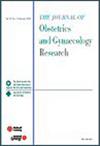The role of serum inflammatory markers in determining the severity of cervical lesions
Abstract
Objective
To evaluate the role of serum inflammatory markers in determining colposcopy indications more accurately, reducing unnecessary colposcopy requests, and preventing overtreatment.
Materials and Methods
In our study, the data of 218 patients who were followed up in our hospital's oncology outpatient clinic between April 2017 and November 2023 and who underwent colposcopy and biopsy for suspected cervical lesions due to Papanicolaou smear test abnormalities or the presence of human papillomavirus were evaluated retrospectively. The parameters of patients with and without cervical lesions were compared. Patients with cervical lesions were compared according to lesion type.
Results
Neutrophil/lymphocyte ratio and platelet/lymphocyte ratio levels were significantly higher in the cervical lesions (+) group compared with the cervical lesions (−) (p < 0.001 and p < 0.001, respectively). Systemic immuno-inflammation index and systemic inflammatory response index levels were significantly higher in the cervical lesions (+) group compared with the cervical lesions (−) group (p < 0.001 and p < 0.001, respectively). Mean platelet volume level was significantly lower in the cervical lesions (+) group compared with the cervical lesions (−) group (p < 0.001). In the group with cervical lesions, no significant relationship was found between the severity of the cervical lesions and serum inflammatory marker levels.
Conclusion
According to the results of our study, although there were significant differences between the serum inflammatory marker levels of patients with and without cervical lesions, their importance in predicting cervical lesions could not be clearly demonstrated. The importance of serum inflammatory markers should be evaluated in prospective studies with larger patient numbers and longer follow-up periods.

 求助内容:
求助内容: 应助结果提醒方式:
应助结果提醒方式:


